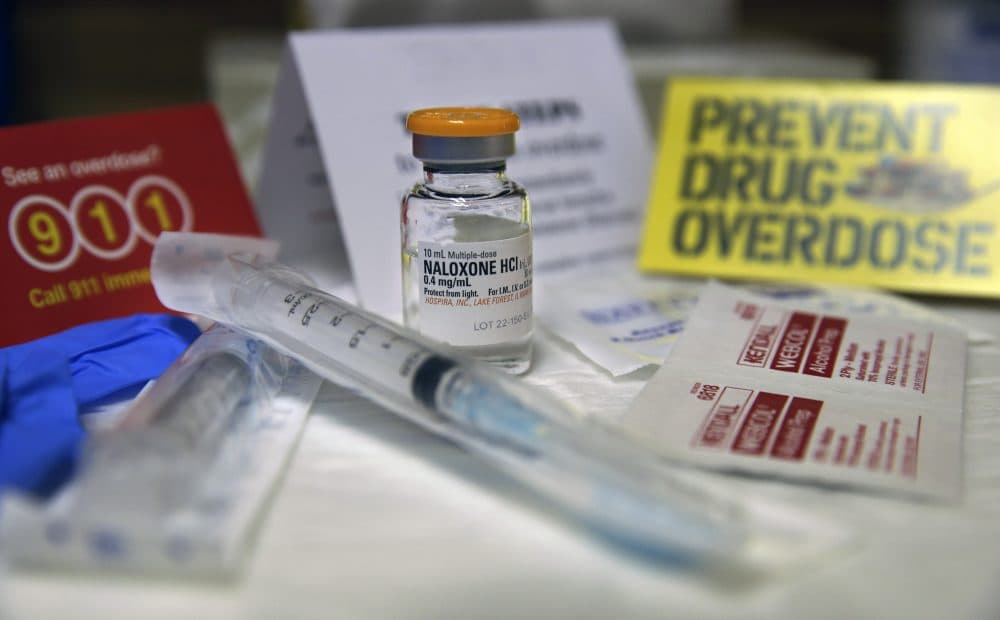Advertisement
Senate To Press Opioid Measures In Budget Talks

House and Senate budget negotiators on Wednesday will begin settling a wide range of spending differences in the annual state spending plan, but in doing so they will also face major decisions about a series of potentially life-saving measures.
Senate negotiators on a six-member conference committee will try to convince their House colleagues to agree to a $5 million program aimed at reducing the death toll from the opioid epidemic.
The proposals, including greater access to overdose-reversing drugs and ways to test for the presence of deadly opioid fentanyl, stem from recommendations made this year by a high-level commission that explored possible new steps state government could take.
While supportive of the measures, activists warned the limited action so far is still far behind where the state should be in its effort to save thousands of lives lost to overdoses every year.
"I'm glad we're taking this small step, but it's a first step," said Aubri Esters, a member of the SIFMA NOW group that has advocated for greater action. "Five million is absolutely nothing compared to what's necessary if we want to stop people from dying."
Opioid overdoses have killed more than 2,000 people in Massachusetts each year since 2016. The state's response to the crisis has been wide-ranging, including more than $147 million in spending on intervention, treatment and recovery programs over the past five years.
While the Senate's $5 million proposal is one component of several aimed at addressing the issue — and is far smaller in scale than the $48 million one-year spending increase Gov. Charlie Baker proposed to expand substance misuse prevention and treatment — its specific approach stems directly from the recommendations of the Harm Reduction Commission convened last year to study the issue.
The latest effort, approved unanimously last week via a budget amendment filed by Sen. Julian Cyr, is built around a change in approach: focusing not directly on stopping the use of opioids, but instead on ensuring that, when use happens, it carries lower risks of disease and death.
"In no way with any other crisis or any other medical disease would we be on hold if there are treatments that work. Nothing would be on hold if there was an outbreak of measles and mumps with 2,000 people dying in a state every year."
Aubri Esters, SIFMA Now and Harm Reduction Committee member
To do so, the proposal calls for $1.5 million to expand a clean-syringe exchange program, allowing those who plan to inject substances to ensure they are not transmitting diseases, and $300,000 to increase availability of nasal naloxone kits — used to counter often-fatal opioid overdoses — in emergency rooms.
Under the proposal, state regulators will be tasked with ensuring that Medicaid and insurance providers cover the costs of handing out naloxone kits to patients discharged from hospitals. A separate proposal, adopted by the Senate after it was offered by Sen. Eric Lesser, adds $500,000 to support municipal bulk purchases of the rescue kits.
Senators took aim at fentanyl, a synthetic drug up to 100 times more potent than morphine that is often cut into other substances without users being aware. In 2018, fentanyl was present in 89% of opioid overdose deaths across Massachusetts where toxicology was screened, and to prevent that, the amendment calls for a $150,000 pilot program to publicly offer test trips that can detect whether a drug contains fentanyl.
Advertisement
The remainder of the $5 million fund calls for another pilot, setting up new "supportive places" across the state. Friedman pointed to Boston Health Care for the Homeless Program's SPOT location, where individuals can go after using drugs to be observed for overdoses and referred to treatment, as a model.
SPOT serves about 400 unique individuals per year, and about 22% end up in treatment, according to BHCHP chief medical officer Jessie Gaeta — but crucially, she said, referrals to further service tend to come after a dozen visits or more, underlining the importance of relationship-building.
House lawmakers did not include similar language in their version of a fiscal year 2020 budget, so it will be up to senators to convince the six-member conference to recommend the measures in the final budget.
Lawmakers have so far steered clear of one of the commission's high profile recommendations.
To prevent as many deaths as possible, the panel recommended that the state pilot "one or more" facilities where individuals can use drugs under the watch of medical professionals who can immediately intervene in case of an overdose, all without threat of arrest.
So-called "safe injection sites," or "safe consumption sites," have been a topic of intense debate — in fact, the commission was formed as a compromise to legislation that would have launched a pilot. Baker has opposed such efforts, pointing to threats of prosecution from U.S. Attorney Andrew Lelling, while many lawmakers are likely waiting to see the results of a federal lawsuit over a similar site in Philadelphia before deciding whether to make another push in Massachusetts.
Both Cyr and Friedman said safe consumption sites are still on the table this session, and they plan to support relevant bills currently awaiting committee hearings. But advocates see further delays as political calculus that continues to endanger a community in need.
"Every year we wait, we lose another 2,000 people, and that's absolutely unacceptable," Esters, who was also a member of the Harm Reduction Commission, said. "In no way with any other crisis or any other medical disease would we be on hold if there are treatments that work. Nothing would be on hold if there was an outbreak of measles and mumps with 2,000 people dying in a state every year."